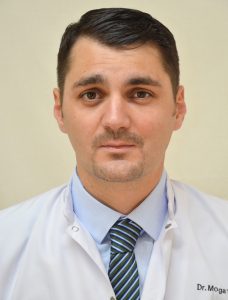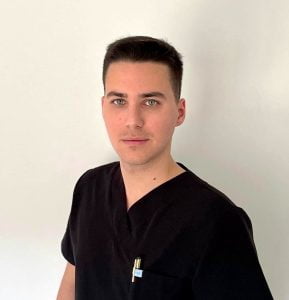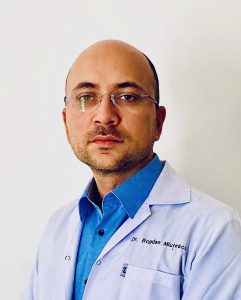Address: Spitalul Clinic Judeţean de Urgenţă “Pius Brânzeu” Timişoara, B-dul Liviu Rebreanu, nr. 156, 300723, Timişoara
Phone: 0256488003
E-mail: ulctimisoara@gmail.com; gastroenterotm@yahoo.com; sirli.roxana@umft.ro
Head of the University Clinic
Members
External Collaborators
The Clinic of Gastroenterology and Hepatology has been operating as an independent University Clinic within the “Victor Babeș” University of Medicine and Pharmacy (UMF) in Timișoara for over 30 years. Over time, its medical and scientific activities have continuously developed, strengthening its reputation as a center of excellence in the western region of the country.
The clinic’s scientific activity has been officially recognized through its accreditation as a Type C Research Center by CNCSIS in 2004. Since 2020, the clinic has become the Advanced Research Center in Gastroenterology and Hepatology of UMF “Victor Babeș.” Additionally, the Advanced Research Center in Hepatology of the Academy of Medical Sciences operates within this discipline. Through these structures, the clinic has established a strong research tradition, training doctoral students and contributing to the professional and scientific development of young doctors.
The clinic’s main research directions include:
• Early detection and management of colorectal cancer,
• Percutaneous treatment and monitoring of liver tumors,
• Diagnosis, modern treatment, and monitoring of chronic viral liver diseases,
• Early diagnosis and management of inflammatory bowel diseases,
• Development of artificial intelligence systems for abdominal ultrasound and endoscopy.
The clinic has specialized departments for endoscopy and ultrasound, which significantly contribute to both scientific and clinical activities. A key reference point is the Ultrasound Training Center, established under the aegis of the “Victor Babeș” University of Medicine and Pharmacy in the 1990s. This center became an Education Center of the World Federation for Ultrasound in Medicine and Biology (WFUMB) in 2007 and, since 2014, an Ultrasound Education Center of the European Federation of Societies for Ultrasound in Medicine and Biology (EFSUMB).
Internationally, the clinic is recognized for its innovative research in contrast-enhanced ultrasound (CEUS) and the non-invasive assessment of liver fibrosis using elastography methods. In 2008, the clinic organized the EFSUMB Congress, and in May 2022, it hosted the WFUMB Congress, the first world congress of its kind held in Romania.
In the field of chronic liver diseases, the clinic is a European and global leader in the use of ultrasound-based elastography for diagnosing these conditions through non-invasive methods. The team’s contributions have been reflected in articles published in high-impact journals and participation in the development of the European and World Guidelines on Elastography (EFSUMB and WFUMB). Furthermore, the clinic has conducted landmark research on the treatment of hemodialysis patients with chronic HCV hepatitis, a topic considered a national priority at the time.
The clinic’s medical activities include advanced endoscopic techniques such as:
• Endoscopic treatment of upper gastrointestinal bleeding,
• Endoscopic retrograde cholangiopancreatography,
• Palliative treatment of digestive neoplasms,
• Endoscopic ultrasound.
Through its expertise, infrastructure, and remarkable achievements, the Clinic of Gastroenterology and Hepatology stands out as a reference center at both national and international levels.
Advanced Research Center in Gastroenterology and Hepatology (CCA-GASTROHEP)
The Center for Advanced Research in Gastroenterology and Hepatology of the Victor Babeș University of Medicine and Pharmacy includes 10 full members, 8 associate members (Doctoral students) and 1 external collaborator.
One of the main topics of research in this Center is the evaluation of patients with non-alcoholic fatty liver disease (NAFLD), this pathology becoming very common in current clinical practice. The purpose is to identify an algorithm for the early identification of patients with liver fibrosis by non-invasive elastographic methods. A multidisciplinary approach is desired between the disciplines of Gastroenterology and Hepatology, Diabetes Nutrition and Metabolic Diseases, Biochemistry, Genetics and Cardiology, through which patients at risk of developing severe fibrosis, respectively those with type 2 diabetes mellitus and those with metabolic syndrome to be evaluated clinically, biologically, elastographically, through genetic and metabolomic tests.
A second research topic is the identification of biomarkers useful in the early diagnosis of hepatocarcinoma in clinical practice. It is well known that imaging methods are an essential component in the diagnosis and staging of hepatocarcinomas (HCC). Available published data show that certain biomarkers (AFP, AFP-L3, DCP) are suboptimal for the routine surveillance of the patient at risk of HCC. Thus, our research aims to investigate the respective sensitivity of the specificity of five biomarkers: AFP, AFP-L3, DCP, GPC3, CK19 for the detection of HCC. This study implies a collaboration between our department and the Department of Biochemistry.
The third research topic is the complex evaluation of the nutritional status of the patients with chronic hepatopathies. Currently, there is no “gold standard” for the nutritional evaluation of such patients. Thus, we aim to identify easily applicable, non-invasive methods that can be performed routinely to all these patients. In this regard, we have initiated a collaboration with the Imaging Department in order to detect sarcopenia by CT in cirrhotic patients.
The fourth topic of research is metabolomics in the prediction of the severity of acute pancreatitis, which aims to identify independent metabolic factors that influence the evolution of acute pancreatitis to forms with local or systemic complications, respectively the identification of predictive metabolic factors for the prognosis of acute pancreatitis.
Another research topic is in the evaluation of Helicobacter Pylori prevalence in our area and the response to eradication treatment among patients with dyspeptic syndrome. This prospective study will evaluate the effectiveness of 2 regimens used to eradicate Helicobacter Pylori infection, determine the resistance of Helicobacter Pylori to Clarithromycin, Levofloxacin and Metronidazole in our geographical area, and assess the existence of mutations in the genes of RNA 23S Helicobacter Pylori. This study implies collaboration between our department and the Department of Microbiology and Medical Genetics.















